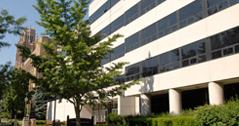Student Resources
Disability Services
Marquette University strives to integrate qualified students with disabilities as fully as possible into all aspects of university life. The Office of Disability Services, located within Student Educational Services, has been designated to coordinate this process in accordance with the university’s compliance responsibilities under the law. Accommodations determinations for all students with identified and documented disabilities will be made on a case-by-case basis. Examples of possible accommodations or services provided to students with disabilities include: alternative texts, interpreting, lecture notes, testing arrangements informal counseling, advocacy training, etc.
More detailed information about accessibility for all students at Marquette can be found on at marquette.edu/disability-services. The Office of Disability Services is located in Marquette Hall, 05; P.O. Box 1881; Milwaukee, WI, 53201-1881; P (414)288-1645; F (414) 288-5799.
Email Policy
Marquette University utilizes email as one of the official means of communication with students to keep them informed of important information such as financial aid and billing data; college deadlines, events and updates; and important campus news. Each student is issued an official eMarq email account for use while he or she is enrolled.
Email is an appropriate and preferred method for official communication by Marquette with students unless otherwise prohibited by law. The university has the right to send official communication to students by email with the assumption that students will receive, read and, if necessary, act in a timely manner based upon these emails. For more information, see the university's email policy at marquette.edu/its/about.
Financial Aid Information Guide
The publication Award Information Guide provides an overview of the available financial aid, how to accept financial aid, debt management, students rights and responsibilities, and federal loan programs. Information is available online at marquette.edu/mucentral/financialaid. Information about different types of financial aid available to graduate students may be found in this bulletin under Financial Aid.
Marquette Central
This office is the primary source for student enrollment and financial services information and assistance. Once a student is admitted to the university, this office is available to help students through Marquette processes and serves as a resource for questions about registration, student financial aid and student accounts. For more information, visit marquette.edu/mucentral.
Schedule of Classes (Snapshot)
Snapshot is an online Schedule of Classes students access to determine what courses to take each term. In addition, Snapshot will provide a list of those classes that meet certain degree requirements or are of special interest, such as online courses. Snapshot can be found at marquette.edu/mucentral/registrar/snapshot.
Student Information System (CheckMarq)
Marquette students obtain up-to-the moment information, monitor their academic record, view courses, register and update their address/phone numbers online by using the CheckMarq system via the Internet. Students can access CheckMarq from any computer with Internet access. Click here to go to checkmarq.mu.edu. CheckMarq requires both a user name and password. Information Technology Services assigns user names and passwords to all new students for the duration of their studies at Marquette.
Transcript of Academic Records
A transcript is a complete and unabridged copy of all academic work attempted at Marquette University. Course and grade information contained on the transcript are released pursuant to the Family Educational Rights and Privacy Act of 1974 (as amended).
A student may obtain a transcript of his or her Marquette record by completing a Transcript Request Form available at marquette.edu/mucentral/registrar and submitting it to the Office of the Registrar. Current students may request a transcript online via their CheckMarq account. All transcript requests should be submitted one week in advance of the date the transcript is needed.
The fee for this regular service is $5 per transcript. The fee for a rush or immediate transcript service is $10 per transcript. All transcript fees are payable at the time of the request.
Every transcript that is issued directly to a student is clearly marked. Because most institutions will not accept a transcript that has been in the student’s possession, we strongly recommend the student request the Office of the Registrar to mail a transcript directly to the institution involved. Students who fail to follow this recommendation are liable for any further charges when additional transcripts are ordered.
Veterans Benefits
The Office of the Registrar acts as liaison between the student and the Veterans Administration, the Wisconsin Department of Military Affairs and the Wisconsin Department of Veterans Affairs. Any student eligible to receive educational benefits under one of the various Veterans Administration programs must report to Marquette Central at the beginning of each fall, spring or summer term for which he or she is registered. Information or consultation is available at any time during regular office hours. Information regarding veterans’ benefits may also be found at marquette.edu/mucentral/registrar.
Marquette participates in the Yellow Ribbon GI Education Enhancement Program; which is a provision of the Post-9/11 GI Bill. This program allows institutions of higher learning in the United States to voluntarily enter into an agreement with the VA to fund tuition expenses that exceed the highest in-state public undergraduate rate. The number of student sponsored for Yellow Ribbon Program benefits is limited. For additional information visit the Veterans Benefits site on the Marquette Central website.
VA regulations require schools to enforce certain standards of progress in regard to certifying veterans for educational benefits; therefore any veteran who wishes to receive veterans’ educational benefits must meet the published academic standards and requirements of the university.
Facilities
Haggerty Museum of Art
Opened in 1984, the Haggerty Museum of Art serves as a laboratory for learning focused on the visual arts by collecting, exhibiting and interpreting works of art in the context of Marquette University and Milwaukee. The museum’s exhibitions and educational programs are designed to contribute to transformational lifelong learning and enjoyment of the arts.
The Haggerty features approximately eight to nine exhibitions each year. Representing the diversity of work in the permanent collection of over 4,500 objects, the museum has offered exhibitions celebrating the contributions of the Italian Renaissance “Petite Masters”, American self-taught artists, works addressing social change issues, modern American printmaking and photography, and contemporary art by regional, national and international artists.
The Haggerty seeks to enhance the undergraduate educational experience by engaging students in various disciplines to think about the world and their subject matter through the lenses of the visual arts. The museum also works collaboratively with elementary and middle school teachers, local artists, and College of Education faculty and students to design programs that engage children and youth in educational activities. Additional educational opportunities for the campus and community include free tours, lectures, workshops and performances.
Hartman Literacy and Learning Center
The Hartman Literacy and Learning Center is a facility within the College of Education which supports undergraduate and graduate literacy-related programs. The center library houses a children’s literature collection, which is used by College of Education students as well as children and families participating in the Marquette University Family Literacy Project, a collaboration between the university and neighborhood elementary schools. Students enrolled in participate in the Family Literacy Project by tutoring small groups of children in reading and writing after school. The Hartman Literacy and Learning Center provides faculty and staff to support and conduct research regarding the project.
Instructional Media Center
The Kenneth Shuler Instructional Media Center (IMC) provides a wide range of multimedia creation and presentation services for the Marquette University community. The IMC’s primary obligation is to support and enhance Marquette’s classroom instruction through technology. The IMC is also responsible for audio-visual equipment distribution and technical support in presentation classrooms throughout the campus. In addition, the IMC produces media that augment the university’s public communication goals. These efforts include the creation of photography, audio, videos, and multimedia for informational, development and student recruiting purposes.
The facilities of the IMC are state-of-the-art and an important component of the J. William and Mary Diederich College of Communication’ broadcasting curriculum. Our facilities include two digital television studios, eight video editing suites, three audio studios, and computer graphics platforms. These advanced facilities are used as classrooms and laboratories by students pursuing a degree in Broadcast and Electronic Communication. Students also have access to these facilities as they participate in MUTV and/or MUR the student operated campus television and radio stations.
Libraries Overview
The University’s libraries support the teaching, research and service mission of Marquette University by providing access to recorded knowledge through collections, services, cooperative programs and connections to worldwide resources. The libraries combine state-of-the-art technologies with a repository of information in an atmosphere of service and learning. A full description of resources, hours, news and services is found at the Libraries’ marquette.edu/library.
Collections of more than 1.7 million volumes and 3,700 print subscriptions are housed in the John P. Raynor, S.J, Library and the adjoining Memorial Library; the Law Library is separately described below. The libraries’ shared online catalog, MARQCAT, includes all book and periodical holdings, locations and circulation status.
Raynor Memorial Libraries
The new (2003) Raynor Library holds a commanding position at the physical and intellectual center of the campus. Raynor Library, seating 1,100, is designed around the needs of its users, preserving the university’s extensive traditional collections, while expanding its capacity for incorporating digital technology into access and delivery of information. The library offers over 300 online databases, thousands of books in digital format, and an ever-growing (over 26,000 titles) collection of full-text online newspapers, journals and magazines. The primary service point in Raynor is the two-level Information Commons (IC), with over 240 networked PCs and Macs, multimedia hardware and software and comfortable small group study spaces. The Information Desk is open 104 hours weekly and, in addition, offers research consultations by appointment, and phone, IM, e-mail and 24/7 “chat” assistance through its AskUs! services.
Raynor’s first level is open 24/7 when classes are in session, and the second level and bridge are open until 2 a.m. Sunday through Thursday, offering access to workstations and comfortable, safe late-night study space. Library hours during the summer, intercessions and holidays are posted and updated regularly on the 24-hour recorded message at (414) 288-1530.
Additional features of Raynor Library include: reference collections, circulating laptops with wireless connectivity, the Class Reserves and Media Services Desk, Browsing and Spirituality collections and the Funding Information Center. A conference center accommodating large groups and video conferencing, the Writing Center and the Center for Teaching and Learning are also located in the facility. The second-level bridge entrance to Memorial Library features a 4,800 square foot café with casual seating, popular reading materials and wired and wireless network connections.
Memorial Library, renovated top-to-bottom in 2004 and entered via the 2nd level bridge, houses the majority of the book and journal collections. The library is open 104 hours weekly and offers a variety of seating choices for over 1,050 readers. An open stack arrangement presents over six linear miles of compact shelving for bound journals on the lower level, plus book shelving on five floors. The facilities in this library include a circulation desk, a cluster of PCs, and assigned research carrels for faculty and graduate students.
Most library services and online research databases are available to students 24/7 from both on- and off-campus locations. Class reserve readings are digitized for online access whenever possible. Interlibrary Loan provides both books and journal articles from other libraries on request and a variety of other cooperative programs assure library privileges for Marquette students at other libraries in Southeastern Wisconsin. The Milwaukee County Federated Library System, including the Central Library just four blocks from campus, also lends to Marquette students. Above all, service-oriented staff members are committed to guiding and teaching users throughout the research process.
Special Collections and Archives
Raynor Library also houses the Department of Special Collections and Archives and its research/exhibit area on the third floor. Its archival and manuscript collections and over 7,000 rare books include the archives of Marquette University; the papers of faculty, students, staff, and alumni; and major collections relating to Christianity among Native Americans and 20th-century Catholic social action. These include research collections for the following individuals and organizations: the Bureau of Catholic Indian Missions, Dorothy Day and the Catholic Worker movement, the National Catholic Conference for Interracial Justice, and the National Catholic Rural Life Conference. J.R.R. Tolkien’s original manuscripts form a unique and notable research collection.
For more information on Raynor Memorial Libraries:
- Libraries’ website at marquette.edu/library.
- Campus map showing campus libraries at marquette.edu/campus-map/marquette-map.pdf
- AskUs! Phone, e-mail, IM, or text information services marquette.edu/library/research/askus.shtml
- Hours at marquette.edu/library/about/hours.shtml or 24-hour recorded message (414) 288-1530.
Law Library
The primary mission of the Marquette University Law Library is to support, through its information and service resources, the curricular, research and service activities of the Marquette University Law School faculty and students.
The Law Library is located in the Law School in Eckstein Hall. The collection is comprised of 362,586 volumes representing 199,066 print volumes and 3,200 electronic and print subscriptions. Wireless connectivity is available throughout Eckstein Hall.
The Law Library maintains a comprehensive electronic and print collection of primary legal materials from all jurisdictions in the United States as well as a growing collection of international and comparative legal materials. In addition, the Law Library subscribes to BNA, the online CIS Serial Set, Hein Online, Lexis-Nexis, Loislaw, Westlaw and Wisconsin CLE materials, and is a depository of federal government information resources.
Public Safety
As the Marquette community is located in downtown Milwaukee, students need to be aware of the realities of city living. Recognizing this, the university strives to educate students about personal safety and crime prevention through a wide variety of safety programs and services.
Marquette maintains its own Department of Public Safety as a security and safety service to the university community. The department is located on the first floor of the 16th Street Parking Structure, 749 N. 16th St. (between Wisconsin Avenue and Wells Street). This location houses Public Safety Administration, Officer Operations, Communications Center, Preventive Services, and Student Safety Programs. Public Safety operates 24 hours a day, every day. Services can be obtained by calling (414) 288-6800. In cases of emergency, students and employees should contact Public Safety’s emergency line by dialing (414) 288-1911 from any campus extension or (414) 288-1911 from any off-campus phone.
Public Safety officers monitor on- and off-campus areas utilizing squad, foot and bicycle patrols. Public Safety officers are trained to respond to all calls for assistance, including crimes in progress and medical emergencies. University Service officers are responsible for monitoring campus buildings and property. The officers conduct walking patrols, provide authorized after-hours access to buildings, assist public safety officers and are available to provide information and assistance to students, staff and visitors. Security within the university’s residence facilities is provided by Safety Services officers, who are on duty from 11:30 p.m. to 7:30 a.m., daily.
The department maintains an outdoor telephone system, including more than 200 Blue Light Phones. Blue Light Phones are located on campus pedestrian walkways, mall areas and within or near all of the university’s parking lots. Blue Light Phones are located at Valley Fields as well as in the near off-campus residential area. Blue Light Phones provide a direct link to Public Safety’s Communication Center. Upon activation of a Blue Light Phone, the caller’s location is immediately known to the communications officer, who will provide the appropriate assistance.
A wide variety of crime prevention and safety awareness programs are made available to groups that are interested in promoting safety. Popular topics include self defense, personal safety, sexual assault prevention and alcohol awareness. Numerous brochures, the Awareness newsletter and crime statistics are readily available to provide information.
Any member of the Marquette community who becomes involved in a crisis situation can receive the benefits of the Victim/Witness Services program. The program provides resources for those in need of counseling or support services in addition to providing escorts to and from all necessary court-related appearances.
Public Safety complies with the Jeanne Clery Disclosure of Campus Security Policy and Campus Crime Statistics Act through the publication of the Safety Resource Guide, which includes campus crime statistics and crime prevention strategies. Copies of the Safety Resource Guide are available from Public Safety at marquette.edu/publicsafety/ or by calling (414) 288-7320.
Research Centers and Institutes
In order to foster and enhance research and study at Marquette University, a number of units on campus have established thematic research centers and institutes. These centers and institutes offer the opportunity for active collaboration and research in a variety of categorical areas.
The centers generally are designed to bring an interdisciplinary focus to the study of complex problems and involve the participation of several faculty members. Opportunities are available for student participation in the programs of several of the centers and institutes.
The Office of the Provost maintains a list of currently active centers and institutes online at marquette.edu/research/centers.php.
On this page
- Student Resources
- Disability Services
- Email Policy
- Financial Aid Information Guide
- Marquette Central
- Schedule of Classes (Snapshot)
- Student Information System (CheckMarq)
- Transcript of Academic Records
- Veterans Benefits
- Facilities
Graduate School of Management
- Admission and Readmission
- Academic Calendar
- Academic Regulations
- Student Resources and Facilities
- Student Financial Aid
- Tuition Fees and Housing
- Degree/Certificate Programs
- Faculty and Administrators




 Warning:
Warning:








